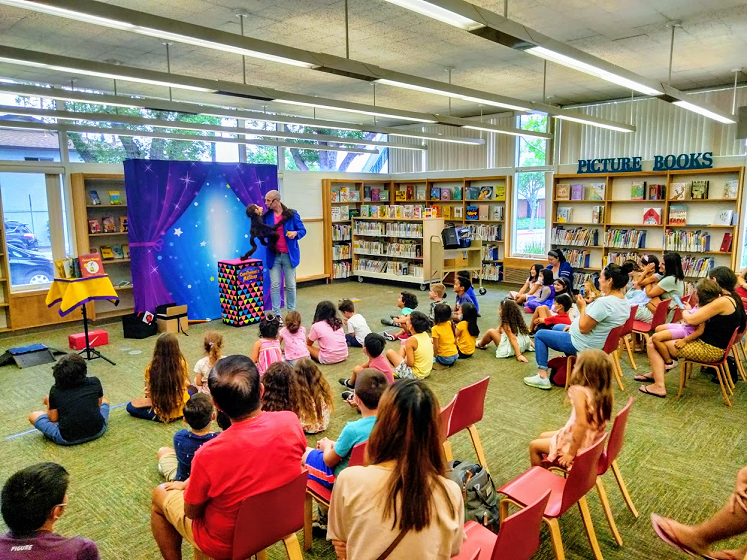Introduction
The theme for National Library Week 2024 (April 7-13) is Ready, Set, Library! National Ambassador for Young People’s Literature and Newbery and Pura Belpré-award winning author Meg Medina will serve as 2024 Honorary Chair.

The Evolution of Libraries:
Libraries have come a long way from their traditional image of silent halls filled with dusty books. While books remain at the core of their collections, libraries have evolved into dynamic spaces offering a wide array of resources and services. From digital archives to maker spaces, libraries cater to the diverse needs and interests of their patrons. National Library Week provides an opportunity to celebrate this evolution and showcase the modern library’s ability to adapt and innovate in response to the changing needs of society.

Empowering Communities:
Libraries serve as inclusive spaces where people from all walks of life can access information, resources, and support. Whether it’s a student seeking research materials, an entrepreneur looking for business resources, or a senior citizen attending a technology workshop, libraries welcome everyone with open arms. Through programs and initiatives tailored to specific demographics, libraries empower individuals to pursue their interests, achieve their goals, and contribute to their communities.
Promoting Literacy and Education:
At the heart of every library is a commitment to promoting literacy and education. From early childhood literacy programs to adult education classes, libraries provide opportunities for people of all ages to develop essential skills and expand their knowledge. National Library Week shines a spotlight on these initiatives, highlighting the critical role libraries play in fostering a love of reading, improving literacy rates, and promoting lifelong learning.

Digital Access and Equity:
In an increasingly digital world, access to technology and the internet is essential for full participation in society. However, not everyone has equal access to these resources. Libraries bridge the digital divide by providing free access to computers, Wi-Fi, and digital resources. Whether it’s helping someone apply for a job online, assisting a student with homework, or teaching digital literacy skills to seniors, libraries play a vital role in promoting digital access and equity.
Celebrating Library Professionals:
As we celebrate National Library Week in 2024, it’s essential to look to the future and consider the evolving role of libraries in our society. With advances in technology, changes in demographics, and shifting educational paradigms, libraries must continue to adapt and innovate to meet the needs of their communities. By embracing new technologies, expanding their reach, and fostering partnerships with other institutions, libraries can continue to thrive and remain indispensable resources for generations to come.
Conclusion:
National Library Week is a time to celebrate the enduring value of libraries and the vital role they play in our communities. From promoting literacy and education to bridging the digital divide and preserving our cultural heritage, libraries enrich the lives of millions of people every day. As we celebrate “Ready, Set, Library!” in 2024, let us reaffirm our commitment to supporting and investing in libraries, ensuring that they remain vibrant, inclusive, and indispensable for generations to come.
Frequently Asked Questions
What is National Library Week?
National Library Week is an annual celebration highlighting the contributions of libraries and library workers in our communities. It’s a time to recognize the importance of libraries as centers for learning, literacy, and community engagement.
When is National Library Week celebrated?
National Library Week typically takes place in April. This year, National Library Week is celebrated from April 7th to April 13th, 2024.
What is the theme for National Library Week 2024?
The theme for National Library Week 2024 is “Ready, Set, Library!” This theme emphasizes the readiness of libraries to serve their communities, their adaptability to changing times, and their commitment to fostering literacy, education, and lifelong learning.
Why are libraries important?
Libraries are important because they provide access to information, resources, and services that are essential for personal and professional growth. They promote literacy, education, and lifelong learning, and serve as inclusive spaces where everyone is welcome.
What resources and services do libraries offer?
Libraries offer a wide range of resources and services, including books, e-books, audiobooks, magazines, newspapers, computers, Wi-Fi, research databases, educational programs, community events, and much more.
How do libraries support literacy and education?
Libraries support literacy and education by providing access to books, digital resources, educational programs, tutoring services, and literacy initiatives.
How do libraries promote digital access and equity?
Libraries promote digital access and equity by providing free access to computers, internet, and digital resources. They offer technology training, digital literacy classes, and assistance with online tasks such as job searching, resume writing, and filling out forms.
How do libraries preserve cultural heritage?
Libraries preserve cultural heritage by collecting, cataloging, and archiving books, manuscripts, documents, photographs, audio recordings, and other materials that document our history, culture, and heritage.
How can I support my local library?
You can support your local library by visiting regularly, participating in programs and events, borrowing materials, volunteering your time and skills, donating books or money, advocating for library funding and resources, and spreading the word about the importance of libraries in your community.
What’s Next?
As vital community resources, libraries rely on public funding and support to fulfill their mission and serve their patrons effectively. In the future, we can expect libraries to continue advocating for increased funding, resources, and support from government agencies, philanthropic organizations, and the public to ensure their long-term sustainability and success.
As we look to the future of libraries, it’s clear that these invaluable institutions will continue to evolve, innovate, and adapt to meet the changing needs of their patrons and communities. By embracing technological advancements, strengthening community partnerships, promoting diversity, equity, and inclusion, fostering lifelong learning, addressing social and environmental challenges, and advocating for funding and support, libraries will remain vibrant, dynamic, and indispensable centers of learning, innovation, and community engagement for generations to come.
